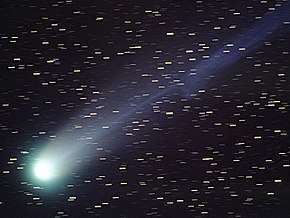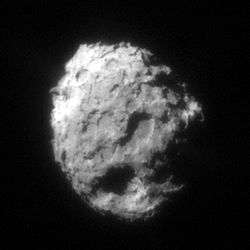71P/Clark
71P/Clark is a periodic comet in the Solar System with an orbital period of 5.5 years.
| Discovery | |
|---|---|
| Discovered by | Michael Clark |
| Discovery date | June 9, 1973 |
| Alternative designations | 1973 V; 1978 XXIII; 1984 VIII; 1989 XX; 1994t |
| Orbital characteristics A | |
| Epoch | March 6, 2006 |
| Aphelion | 4.685 AU |
| Perihelion | 1.562 AU |
| Semi-major axis | 3.124 AU |
| Eccentricity | 0.4999 |
| Orbital period | 5.521 a |
| Inclination | 9.4883° |
| Last perihelion | June 30, 2017[1] December 15, 2011 |
| Next perihelion | 2023-Jan-21[2] |
It was discovered by Michael Clark at Mount John University Observatory, New Zealand on 9 June 1973 with a brightness of apparent magnitude 13. Subsequently it has been observed in 1978, 1984, 1989, 1995, 2000, 2006, 2011[3] and 2017.[4]
See also
References
- Syuichi Nakano (2011-02-06). "71P/Clark (NK 2030)". OAA Computing and Minor Planet Sections. Retrieved 2012-02-18.
- MPC
- "71P/Clark". Cometography. Retrieved 25 February 2015.
- "APOD 2017, May 27 - Comet Clark is near the Edge". Retrieved 27 May 2017.
External links
- Orbital simulation from JPL (Java) / Horizons Ephemeris
- 71P/Clark – Seiichi Yoshida @ aerith.net
| Numbered comets | ||
|---|---|---|
| Previous 70P/Kojima |
71P/Clark | Next 72P/Denning–Fujikawa |
This article is issued from Wikipedia. The text is licensed under Creative Commons - Attribution - Sharealike. Additional terms may apply for the media files.

